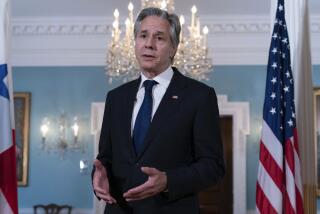U.S. Sees Baltic States Winning Their Freedom
WASHINGTON — The Bush Administration has concluded that Lithuania, Latvia and Estonia probably will succeed in winning some form of independence from the Soviet Union and has decided that the best policy for the United States is simply to keep out of the way, officials said Thursday.
“We think independence is coming” for the three Baltic states, one official said. “It may take some time, and there may be a transitional period first. But the whole direction of the process is toward independence.”
The United States has long called for independence for the three tiny states, which were seized and incorporated into the Soviet Union in 1940. But only in the past two years, as Soviet President Mikhail S. Gorbachev has allowed nationalist movements to organize in the area, has the goal become real.
Ironically, now that independence may finally be in sight, the Administration has decided to stop speaking about it in public, officials said. “We’ve decided that saying nothing may be the best course,” one declared.
Indeed, President Bush and other officials have taken pains to praise Gorbachev for his approach to the issue.
“To the man’s credit, he has been the big advocate of peaceful change,” Bush told reporters last week in response to a question on the Baltic states. “He has been the advocate of reform. . . . I hope that this approach that he has taken, for which we give credit, will prevail.”
Bush even referred to the Baltic states as “internal affairs” of the Soviet Union--a description that violates the formal U.S. refusal to recognize their absorption by Moscow.
Other officials said the formal position still stands. But they said that, in practice, the best way to encourage Moscow to grant independence to the Baltic states is to make the process as painless as possible for Gorbachev.
“You’re going to see us talking more about ‘self-determination’ for the Baltics, instead of ‘independence,’ ” one official said. “The word ‘independence’ is like sticking a finger in the Soviets’ eyes.”
The officials say they expect serious negotiations between Moscow and Baltic political leaders to begin after Soviet elections this spring. Lithuania’s local Communist Party already has decided to allow multi-party elections, and Latvia and Estonia are expected to follow, they said.
The negotiations will be aimed at devising arrangements for the autonomy of the Baltic states within the Soviet Union. “But it is clearly the intention of most people in the Baltics to turn autonomy into independence,” one U.S. official said.
He suggested that the three republics may evolve quickly into states that are formally part of the Soviet Union, but independent in “everything except foreign policy and defense.”
Gorbachev, who began a three-day visit to Lithuanian capital of Vilnius on Thursday, “may come away with a much better grasp of how strong the desire for independence is,” the official said. The fact that Gorbachev took several members of the Soviet leadership with him suggested that he may be seeking to build a consensus for his relatively liberal policy.
Gorbachev has promised Bush that he will not use force to put down the peaceful independence movements of the Baltics, according to American officials. “He (Gorbachev) keeps reiterating his conviction about peaceful change,” Bush said last week. “So, I support that. But we did have an opportunity to discuss in broad philosophical terms this question” at the Malta summit last month.
The key to Gorbachev’s policy, one U.S. official said, is “peaceful change.” As long as the nationalist movements in the Baltics remain nonviolent, the Soviet leader appears willing to negotiate with them.
“And the Baltics have been very good about sticking to nonviolence,” he added. “That has not been the case in other parts of the Soviet Union, like Azerbaijan.”
Official U.S. spokesmen stuck carefully to the Administration’s decision to avoid saying anything that might get in Gorbachev’s way.
“We aren’t going to speculate on the political difficulties in the Soviet Union,” White House Press Secretary Marlin Fitzwater said. “The President certainly supports the reforms and the efforts that . . . Gorbachev has made.” When questioned by reporters, Fitzwater acknowledged that the United States still does not recognize the incorporation of the Baltic states into the Soviet Union. But, he added, “We don’t want to take any positions that are not helpful to either side.”
More to Read
Sign up for Essential California
The most important California stories and recommendations in your inbox every morning.
You may occasionally receive promotional content from the Los Angeles Times.











